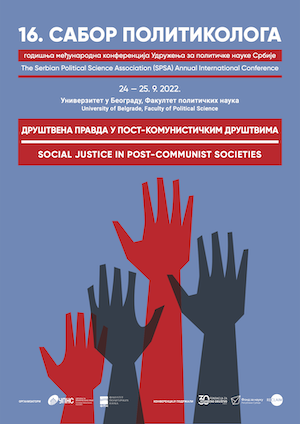16th Serbian Political Science Association Annual International Conference
SOCIAL JUSTICE IN POST-COMMUNIST SOCIETIES
Venue - Faculty of Political Science, Belgrade, September 24-25, 2022
Conference Programme
Book of Abstracts

Over 30 years have passed since the fall of the Berlin Wall and the start of political and economic transformation of the communist world. Is it the right time to take stock of the phenomena? Granted, post-communist societies are different from communist ones. Are they also more just? We look into one particular aspect of the post-communist transformation – just society from a political, economic, and social point of view.
Dominant ideas of 1989 were derived from the success of the market in the US and the UK. Central and Eastern Europe was supposed to imitate the West and catch up with it by implementing their political and market institutions. The introduction of private property and the market would create not only an efficient economy and prosperity, but also a more just society. The idea of a just society in the post-communist world was derived from the ideas of meritocracy, positive selection, and market justice. Market institutions will enable positive selection, which will produce a realistic evaluation of the market contribution of each individual. Once the market determines everyone’s worth, we will know how resources should be allocated. Did this bring about social justice?
Although market reforms did bring about some progress, the “tide that should have lifted all boats” has unfortunately never appeared, and it seems that most post-communist economies today are less fair than 32 years ago. The market concept of transition did not only result in larger social and economic inequalities, deeper divisions between the well-off and the badly-off, but also in democratic decline, the rise of right-wing, populist, and anti-establishment parties.

